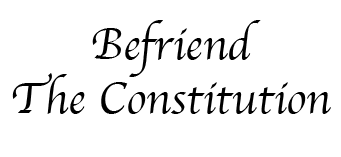The First Freedom
After the delegates at the Constitutional Convention had finished the Constitution, many were concerned because it didn’t contain a list of rights. Some even refused to sign the document for that reason. They all believed that mankind had God-given rights. It worried them that the rights were not specifically set forth in the Constitution. In order to solve this problem, the Bill of Rights was written and added as the first ten amendments to the Constitution. These were ratified and became a permanent part of the Constitution.
The First Amendment begins with these words: “Congress shall make no law respecting an establishment of religion…”. This means that Congress cannot establish a state religion, promote individual religions at the expense of others, or prohibit the establishment of new religions. Up until that time, in England and Europe, the monarch chose or established a single state religion and his or her subjects were required to follow it. If someone decided to do something else, the penalty could be harsh; usually some sort of torture, disfigurement, imprisonment, or death.
Many people tried to change their European governments to allow greater freedom of religion. Most often it was pointless, and people realized that they would never be able to choose for themselves the church they belonged to while they lived in Europe. The Pilgrims, in particular, saw fleeing their home nations as the only solution to escape the oppression they were facing. America was the obvious choice for those seeking religious freedom. The Pilgrims and others traveled to America to enjoy this freedom.
Once here, the people began to form churches and worship according to the dictates of their own conscience. They believed that God gave to each man the freedom to worship Him in any church or manner they wanted. As they began to enjoy the right to join a church without government coercion, they recognized that this right was also vital to the free society they desired.
The First Amendment also states that Congress cannot make laws prohibiting the free exercise of religion. This gives further protection beyond simply preventing state sponsored churches. It’s not enough that we are free to choose our religion, we must also be able to worship in the way we desire, free from government interference. As long as our worship does not infringe on the rights of others we should be able to worship as we please.
Robert D Hales has said that true religious freedom has four basics: The freedom to believe, the freedom to share our faith and our beliefs with others, the freedom to form a church, and the freedom to live our faith. He further stated that we must be free to live our faith in the home, the chapel, and in public places. Freedom of religion is something that comes as a package deal. We need freedom from a state religion, and we need freedom to worship as we choose in our day to day lives. It isn’t just a Sunday freedom. We need to be free to conduct our lives in accordance with our religion, every single day of the week. It isn’t just enough that we aren’t forced to attend a specific church, but we shouldn’t be forced into actions that aren’t consistent with our religious beliefs.
Freedom of religion has been called our “First Freedom”. It is the first freedom protected in the Bill of Rights. When freedom of religion is lost, everything is lost. Freedom of religion is the foundation upon which all our moral freedom rests. When we lose freedom of religion, we lose our freedom to live a moral life. Instead of basing our actions upon our beliefs of right and wrong, we must instead base our actions upon the whims of society. Instead of making decisions based upon our core beliefs, we make decisions based upon the presumed reactions of others. Basically, we lose our ability to make our actions consistent with our knowledge of right and wrong. We begin to live our lives based upon a fear of man, not God. There is a reason that freedom of religion is the “First Freedom.”
